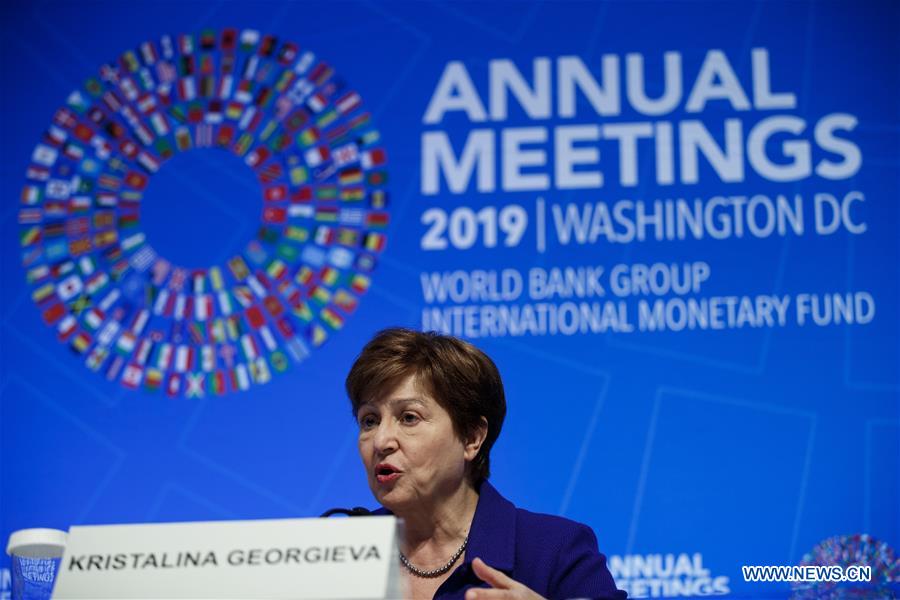Finance ministers, central bankers vigilant on trade tensions, urge IMF quota reform
 0 Comment(s)
0 Comment(s) Print
Print E-mail Xinhua, October 22, 2019
E-mail Xinhua, October 22, 2019

Finance ministers and central bankers worldwide called for concerted efforts to strengthen the multilateral, rules-based trading system amid global trade tensions at the just concluded annual meetings of the International Monetary Fund (IMF) and the World Bank, while demanding continued progress in the IMF's quota and governance reform.
Concerns over trade tensions
In a communique released after the 40th meeting of the International Monetary and Financial Committee (IMFC), the IMF's policy-setting body, the committee said growth outlook is "highly uncertain and subject to elevated downside risks," including trade tensions, policy uncertainty, and geopolitical risks, against a backdrop of limited policy space, high and rising debt levels, and heightened financial vulnerabilities.
"Free, fair, and mutually beneficial goods and services trade and investment are key engines for growth and job creation. A strong international trading system with well-enforced rules addressing current and future challenges would support global growth," the IMFC said in the communique Saturday.
"To this end, we recognize the need to resolve trade tensions and support the necessary reform of the World Trade Organization to improve its functioning," it said.
World Trade Organization (WTO) Director-General Roberto Azevedo said in a statement to the IMFC meeting that "trade tensions, combined with a wider slowdown in aggregate demand in leading economies, have taken a toll on global trade growth." After registering 3 percent growth in 2018, year-on-year growth in merchandise trade, by volume, fell to 0.6 percent in the first half of 2019.
"Easing the current tensions is thus a top priority," Azevedo said. "If we want trade to continue to play its full role in driving growth, development, and productivity, we must acknowledge the essential role that the trading system plays and commit to renewing it for the future."
In its World Economic Outlook (WEO) report released last week, the IMF lowered its global growth forecast for 2019 and 2020, to 3 percent and 3.4 percent, respectively, warning that growth continues to be weakened by rising trade barriers and growing geopolitical tensions.
Noting that the main sources of downside risks are the escalation of trade and geopolitical tensions, Brazil's central bank chief Roberto Campos Neto said that "we call on the major global economies to refrain from imposing new trade restrictions."
Germany's Finance Minister and Vice Chancellor Olaf Scholz said he agrees with the IMF that "it is key" to avoid further escalation and resolve trade tensions. "In case risks materialize and global growth weakens further, we should stand ready for coordinated policy responses to avoid a sharper downturn," Scholz said in his statement to the IMFC meeting.
"Risks associated with policy missteps, including a further escalation of trade tensions, should be avoided," said Australia's Treasurer Josh Frydenberg.
"On the other hand, positive resolution of trade tensions, including on the issues underlying them, would provide a welcome relief to confidence, investment and growth."
"We remain committed to the multilateral, rules-based trading system and efforts to strengthen it should remain a policy priority," said the Australian treasurer.
Yi Gang, governor of the People's Bank of China, said "it is imperative" that all parties work together to build an open world economy by strengthening global cooperation, "resisting all forms of protectionism in trade and investment, and promoting trade and investment liberalization and facilitation."
"To this end, an immediate priority is to resolve the deadlock over the WTO Appellate Body by unblocking its member selection and appointment process," Yi said, adding that the WTO should step up discussions on emerging issues such as e-commerce, trade in services, and investment facilitation, and explore ways to strengthen the rules-based multilateral framework to adapt to the evolving world.
Disappointment with quota reform
Another major topic at the annual meetings is the IMF's quota and governance reform, with many finance ministers and central bankers disappointed with the failure of the global lender's quota increase for emerging markets under the latest quota review, or the 15th quota review.
"This could seriously hamper the effectiveness of the IMF's role in a crisis, as the only source which IMF could rely upon with certainty is its permanent resources, i.e. quotas," said Indian Finance Minister Nirmala Sitharaman, who noted that the lack of adequate support for a quota increase is "somewhat disappointing."






Go to Forum >>0 Comment(s)